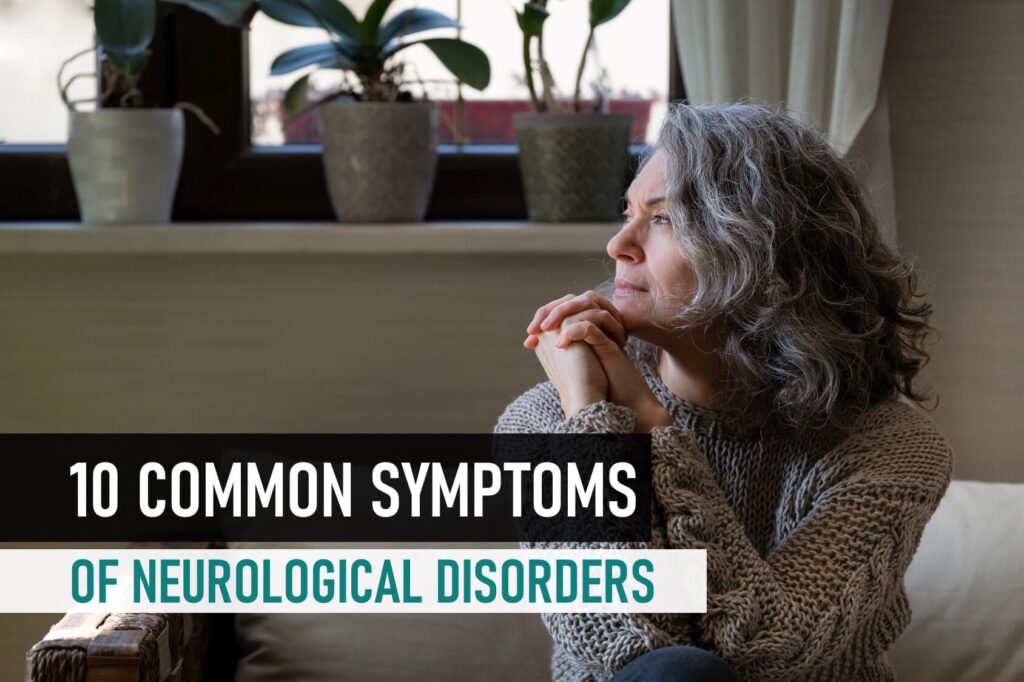Overview – Neurological Disorders
The human nervous system is a complex network that controls and coordinates our bodily functions, allowing us to move, think, and feel. However, sometimes, this intricate system can experience abnormalities and disruptions, leading to neurological disorders. These disorders can affect people of all ages and can be challenging to diagnose.
Early recognition of symptoms is crucial for timely intervention and effective management. In this blog, we will explore ten common symptoms of neurological disorders, raising awareness and promoting early detection.
(1) Headaches & Migraines
Recurring and intense headaches or migraines can be a warning sign of a neurological disorder. While headaches can have various causes, persistent and severe ones should not be ignored. Neurological disorders like migraines are often accompanied by other symptoms such as visual disturbances, sensitivity to light and sound, and nausea.
(2) Persistent Numbness or Tingling
Numbness and tingling sensations, commonly referred to as paresthesia, can be indicative of nerve damage or compression. These sensations may occur in specific body parts or radiate along the nerve pathways. If experienced frequently or in combination with other symptoms, it warrants medical attention.
(3) Muscle Weakness
Unexplained muscle weakness or sudden difficulty in performing routine tasks like gripping objects or climbing stairs may be linked to neurological issues. Weakness in specific muscle groups or generalized muscle weakness could be a sign of various neurological disorders, such as multiple sclerosis or muscular dystrophy.
(4) Balance Problems and Dizziness
Frequent episodes of dizziness or difficulty maintaining balance may suggest an underlying neurological problem. Conditions affecting the vestibular system, which regulates balance, can lead to vertigo and unsteadiness.
(5) Seizures
Seizures are one of the most recognizable symptoms of neurological disorders, such as epilepsy. They can vary in intensity and presentation, from brief moments of altered consciousness to convulsions. If seizures occur more than once, a thorough neurological evaluation is essential.
(6) Cognitive Impairment
Changes in cognitive abilities, such as memory loss, confusion, difficulty concentrating, or language problems, might indicate the presence of a neurological disorder. Dementia and other neurodegenerative diseases can lead to progressive cognitive decline.
(7) Vision Changes
Sudden or gradual changes in vision, such as blurriness, double vision, or visual field defects, may be related to neurological disorders affecting the optic nerve or the brain’s visual pathways.
(8) Speech and Language Difficulties
Struggling to articulate words, slurred speech, or difficulties in understanding language can be signs of neurological issues. These symptoms may indicate conditions like aphasia, which affects language processing centers in the brain.
(9) Tremors and Uncontrolled Movements
Involuntary trembling or uncontrolled movements, known as tremors, can be symptomatic of various neurological disorders, including Parkinson’s disease and essential tremor.
(10) Chronic Pain
Chronic and unexplained pain that doesn’t respond to conventional treatments could have a neurological origin. Conditions like neuropathy can cause persistent pain, tingling, or burning sensations.
Wrapping up…
Neurological disorders can manifest in a wide array of symptoms, and their early recognition is critical for timely diagnosis and management. If you or someone you know experiences any of the mentioned symptoms persistently or in combination, seeking medical attention from a neurologist is essential.
Remember, early intervention and appropriate care can significantly improve the quality of life for those affected by neurological disorders. Stay informed, be vigilant, and prioritize your neurological health.
Source/s: Image by Freepik

